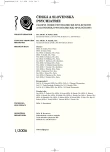Pharmacotherapy for Cognitive Dysfunction in Schizophrenia
Farmakoterapie kognitivní dysfunkce u schizofrenie
Kognitivní dysfunkce se nachází u řady neuropsychiatrických onemocnění. Postupně se dostává do středu zájmu z řady důvodů, hlavně však proto, že je důležitým faktorem ovlivňující fungování nemocného. Má řadu komponent, které jsou spojovány s určitým anatomickým a funkčním substrátem. Nejvíce je studována u schizofrenního onemocnění. Z dostupných farmakoterapeutických možností se nabízí atypická antipsychotika a přídatná medikace, která může jejich efekt augmentovat. Atypická antipsychotika se liší svým farmakologickým profilem, což se také promítá do diferencovaného ovlivnění jednotlivých komponent. Ve srovnání s typickými antipsychotiky je jejich pozitivní ovlivnění kognitivní dysfunkce výraznější. Testována byla augmentace základních neurotransmitérů, které se podílejí na kognitivní dysfunkci. Jedná se o noradrenergní, cholinergní a glutamátergní augmentaci, další možností jsou látky modulující serotonergní receptory. Cholinergní augmentace byla primárně propracována u demence.
Klíčová slova:
kognitivní dysfunkce, první epizoda schizofrenie, atypická antipsychotika, přídatná léčba, augmentace.
Authors:
E. Češková; H. Kučerová; T. Kašpárek; R. Přikryl
Authors‘ workplace:
Psychiatrická klinika LF MU a FN, Brno
přednosta prof. MUDr. E. Češková, CSc.
Published in:
Čes. a slov. Psychiat., 102, 2006, No. 1, pp. 13-17.
Category:
Comprehensive Reports
Overview
Cognitive dysfunction is found in many neuropsychiatric disorders. It becomes the centre of attention for many reasons, mainly because it is a very important factor influencing the functioning of the patients. The cognitive dysfunction involves several components, which are associated with a certain anatomical and functional substrate. Most studies were performed in patients with schizophrenia. The available pharmacotherapeutic possibilities include atypical antipsychotics and adjunctive treatment, which can further augment the effect of atypicals. The atypicals differ by their pharmacological profile, and this is also reflected in the differentiated effects on individual components. In comparison with typicals, atypical antipsychotics improve cognitive dysfunction more. The augmentation of basal neurotransmitters related to cognitive dysfunction (noradrenaline, acetylcholine, glutamate) and serotonin receptor modulators are studied. The cholinergic augmentation is primarily studied in dementia.
Key words:
cognitive dysfunction, first-episode schizophrenia, atypical antipsychotics, adjunctive treatment, augmentation.
Labels
Addictology Paediatric psychiatry PsychiatryArticle was published in
Czech and Slovak Psychiatry

2006 Issue 1
- Hope Awakens with Early Diagnosis of Parkinson's Disease Based on Skin Odor
- Memantine in Dementia Therapy – Current Findings and Possible Future Applications
- Memantine Eases Daily Life for Patients and Caregivers
- Deep stimulation of the globus pallidus improved clinical symptoms in a patient with refractory parkinsonism and genetic mutation
Most read in this issue
- Parental Alienation Syndrome
- Childhood Autism: A Research Update
- Pharmacotherapy for Cognitive Dysfunction in Schizophrenia
- Sexual Aggression in Women
